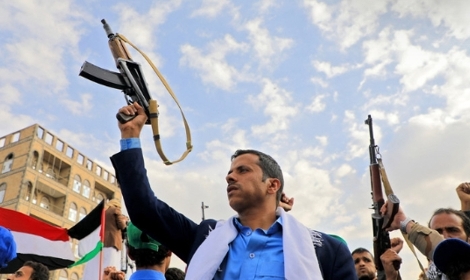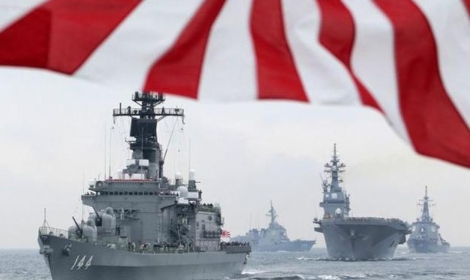为什么美国成功地把民主强加给日本,却在伊拉克失败了?
正文翻译
Trevor Krause
I think all the other answer missed the main point. After WWII the USA and the allies stated that they were committed to staying in Japan overseeing the full transition to democracy and they were prepared to be there for a long time until the mission was successfully completed. They would also make sure enough personnel, military and other, were available with resources to prevent other foreign nations from interfering in the process. And the USA and Allies kept their promise. The same deal was done for Germany and Korea.
我认为其他答案都忽略了主要问题。二战后,美国和盟友宣称他们致力于留在日本,监督完全转型为民主政治,并准备长期留在那里,直到任务成功完成。他们还将确保足够的人员、军事和其他资源可用,以防止其他外国干扰这一过程。美国和盟友信守了承诺。同样的协议也适用于德国和韩国。
Come Iraq and the US forces and Coalition partners had just finished sweeping aside the obvious forces of the last regime, then in a rush to leave the country said hold an election, set up a government and bureaucracy, now you have a democracy, you are on your own, we are going home, live long and prosper.
但在伊拉克,美国部队和联军伙伴刚刚扫除了上届政权的明显势力,然后急于离开该国,说让他们举行选举,建立政府和官僚机构,现在你们有了民主,你们自己负责,我们回家了,长寿和繁荣
US forces are still stationed in Japan, Germany and Korea more than 50 years after the wars officially ended. The US has never appeared to have given that commitment to Iraq as a means of stabilizing a nation beset by problems internal and external in a volatile region. Iraq is a nation which is about as close as you can get to being a failed state without actually being called one.
二战后50多年,美军仍驻扎在日本、德国和韩国。美国似乎从未给伊拉克这样的承诺来稳定一个内部和外部问题繁多的国家,而它位于一个动荡的地区。伊拉克是一个接近于失败国家的国家,但并没有真正被称为一个失败国家。
The USA is definitely on the nose in that region of the world, but what else can you expect when you push your weight around, make promises you don’t keep, show disrespect to the locals, keep the wrong sort of company, work with unfounded assumptions and generally bad-mouth the region to others.
美国在该地区绝对名声不佳,但当你肆意妄为、不履行承诺、对当地人不尊重、与不良伙伴合作、基于无根据的假设行事,并向他人诋毁该地区时,其他事情还能期望什么呢?
I think all the other answer missed the main point. After WWII the USA and the allies stated that they were committed to staying in Japan overseeing the full transition to democracy and they were prepared to be there for a long time until the mission was successfully completed. They would also make sure enough personnel, military and other, were available with resources to prevent other foreign nations from interfering in the process. And the USA and Allies kept their promise. The same deal was done for Germany and Korea.
我认为其他答案都忽略了主要问题。二战后,美国和盟友宣称他们致力于留在日本,监督完全转型为民主政治,并准备长期留在那里,直到任务成功完成。他们还将确保足够的人员、军事和其他资源可用,以防止其他外国干扰这一过程。美国和盟友信守了承诺。同样的协议也适用于德国和韩国。
Come Iraq and the US forces and Coalition partners had just finished sweeping aside the obvious forces of the last regime, then in a rush to leave the country said hold an election, set up a government and bureaucracy, now you have a democracy, you are on your own, we are going home, live long and prosper.
但在伊拉克,美国部队和联军伙伴刚刚扫除了上届政权的明显势力,然后急于离开该国,说让他们举行选举,建立政府和官僚机构,现在你们有了民主,你们自己负责,我们回家了,长寿和繁荣
US forces are still stationed in Japan, Germany and Korea more than 50 years after the wars officially ended. The US has never appeared to have given that commitment to Iraq as a means of stabilizing a nation beset by problems internal and external in a volatile region. Iraq is a nation which is about as close as you can get to being a failed state without actually being called one.
二战后50多年,美军仍驻扎在日本、德国和韩国。美国似乎从未给伊拉克这样的承诺来稳定一个内部和外部问题繁多的国家,而它位于一个动荡的地区。伊拉克是一个接近于失败国家的国家,但并没有真正被称为一个失败国家。
The USA is definitely on the nose in that region of the world, but what else can you expect when you push your weight around, make promises you don’t keep, show disrespect to the locals, keep the wrong sort of company, work with unfounded assumptions and generally bad-mouth the region to others.
美国在该地区绝对名声不佳,但当你肆意妄为、不履行承诺、对当地人不尊重、与不良伙伴合作、基于无根据的假设行事,并向他人诋毁该地区时,其他事情还能期望什么呢?
评论翻译
Laurie Pettitt
Japan adopted Democracy. Their own system had failed them. After WWII, America’s aims were benevolent. Japan needed to be disarmed and, like Germany, brought quickly to some semblance of normality. Again, as with Germany, no punishment of the nation as a whole, just the perpetrators. Good policy. Look how far Japan has come. And look how Japan has the kind of status in the Pacific that it tried to get by force of arms. Iraq was different in that Sadam was containing all sorts of factions. Democracy was not the cure. Iraq, unlike Japan, was ripe for Plunder. Countries joined with America for reward not idilogical reasons. The equivalent of Merchant Adventurers backed government policy in America. There was no altruism in our actions in Iraq. People cannot eat votes. People who are hell bent on killing each other in the name of God, or for national identity cannot be soothed. But it takes a long time to help people to evolve out of enmity and Our politicians work on four year cycles.
日本采纳了民主制度。他们自己的制度已经失败了。二战后,美国的目标是善意的。日本需要解除武装,并且像德国一样迅速恢复正常。与德国一样,没有对整个国家进行惩罚,只惩罚了罪犯。这是一个很好的政策。看看日本取得了多大的进步。看看日本通过武力争夺的那种在太平洋地区的地位。伊拉克的情况不同,萨达姆控制着各种派别。民主不是解决之道。伊拉克,不像日本那样,正处于掠夺的状态。其他国家与美国合作是为了奖励而非意识形态原因。相当于商业冒险家支持美国政府的政策。我们在伊拉克的行动中没有利他主义。人们不能靠选票养活自己。以上帝之名或民族身份而互相残杀的人是无法安抚的。但是帮助人们走出敌对态度需要很长时间,而我们的政治家只工作四年周期。
Brian Collins
Japan had an elected Prime Minister since the Meiji Constitution. It is true that the Emperor and various military leaders did have a lot more power in Meiji Japan than they do now, and in many ways, those military leaders’ influence drove Japanese expansionism leading to WWII.
Here for example, is the Japanese general election, 1920.
自明治宪法开始,日本就有选举产生的首相。确实,在明治时期,天皇和各种军事领导人在日本拥有更多的权力,许多方面上这些军事领导人的影响推动了日本的扩张主义,最终导致了二战。
例如,这是1920年的日本大选。
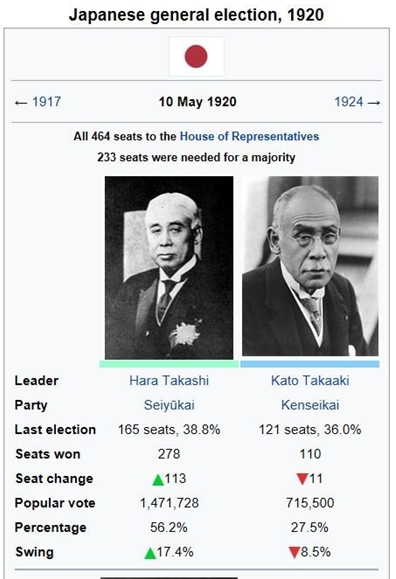
I think a better example would be Germany, which did not have a democratically elected head of state during WWII. Hitler never even won an election to become chancellor or President in the first place—Hitler lost the German presidential election, 1932 in a landslide.
我认为一个更好的例子是德国,在二战期间并没有民主选举产生的国家元首。希特勒甚至从未赢得过总统或总理的选举,事实上,希特勒在1932年的德国总统选举中以压倒性的优势落选。
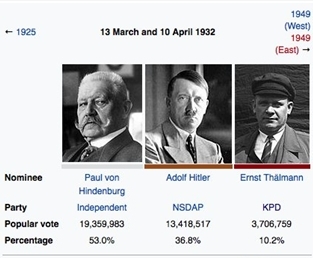
The German Parliament went against the will of the majority of eligible voters, and appointed Hitler into the position of Chancellor, which they themselves created.
On the Parliamentary level, the Nazi party was the largest party after 1932 but still had far less than 50% of Parliament on the day Parliament passed the Enabling Act of 1933, dissolved all parties but the Nazis, and gave Hitler direct control of Germany. The one member of German Parliament who was brave enough to speak out against the bill, Otto Wels, was stripped of his citizenship less than 5 months later.
德国议会违背了大多数有资格选民的意愿,任命希特勒担任总理,而这一职位是他们自己创造的。
在议会层面上,纳粹党在1932年之后成为最大的党派,但在议会通过了1933年的授权法案、解散了除纳粹党以外的所有政党,并直接将权力交给希特勒时,纳粹党在议会中所占的比例远远不到50%。唯一一个在德国议会中勇敢反对该法案的议员奥托·韦尔斯,在不到5个月后被剥夺了公民身份。
The next farce called an election looked like this German election, November 1933:
下一次被称为选举的闹剧发生在1933年11月的德国选举中:
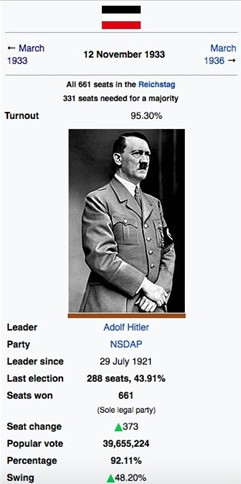
In that election, voters in many communities were told that a ‘no’ vote on Hitler was not allowed, and many people feared reprisals from the government. Even politicians had been executed or lost their citizenship for opposing Hitler in Parliament. Most Germans would vote ‘Yes’ even if they opposed Hitler.
在那次选举中,许多社区的选民被告知,对希特勒投下“反对”票是不允许的,许多人害怕政府的报复。甚至有政治家因为在议会中反对希特勒而被处决或失去了公民身份。大多数德国人即使反对希特勒,也会投“赞成”票。
So, for Germany, the case could be made that the US (and its allies) turned a dictatorship into democracy—well at least in West Germany.
In East Germany, the Socialist Unity Party of Germany ruled the country in a one-party system.
For the other part of the question, I must ask:
Has democracy in Iraq failed?
因此,对于德国来说,可以说美国(及其盟友)将一种独裁制度转变为了民主制度,至少在西德是如此。而在东德,德国统一社会党以一党制统治了该国。
关于问题的另一部分,我必须问:
伊拉克的民主制度失败了吗?
Has the elected government in Baghdad been overthrown by enemies of the US, akin to the US-backed government of Vietnam being conquered by North Vietnam?
The answer is no. It is true that radical Sunni groups like ISIS did defeat the Iraqi Army on the battlefield hundreds of times before the US started helping them, and at one point the Shia-majority Baghdad government lost control of most of the outlying areas, but does that mean Democracy failed?
巴格达选出的政府是否被美国的敌人推翻,类似于美国支持的越南政府被北越克服?
答案是否定的。确实,像ISIS这样的激进逊尼派组织在美国开始援助之前曾多次在战场上击败伊拉克军队,而且伊拉克什叶派占多数的巴格达政府一度失去了对大部分边远地区的控制,但这是否意味着民主制度失败了?
Most of their defeats were faults of the way the civilian government was fighting ISIS and alienating Sunni factions, and faults in how the military was fighting ISIS.
I think we will need to wait and see if democracy in Iraq has truly failed. If things don’t improve after the Syrian Civil War ends, then maybe.
他们大部分的失败是因为文职政府对抗ISIS和疏远逊尼派派别的方式有缺陷,以及军方打击ISIS的方式有问题。
我认为我们需要等待并观察伊拉克的民主制度是否真正失败。如果在叙利亚内战结束后情况没有改善,那或许可以说是失败了。
Johannes Tantow
I would like to add something to how Hitler became Chancellor.
In the end of the Weimarer Republik, this is mostly the time after the World Economic crisis 1929, the Präsidialkabinette, i.e. governments based on the ernormous might of the Reichspräsident as it is based in the constitution. After the last democratic government of Hermann Müller(SPD), consisting of the SPD, Zentrum, DDP, DVP and BVP, broke down due to disputes about increasing founds to the unemployment benefits.
After that Heinrich Brüning, Franz von Papen and Kurt von Schleicher ruled based on Hindeburg’s power and dependend on him. Hindenburg could disband the Reichstag(parliament of Germany at this time)(Article 25), he could limit the rights of the people and enact laws(Art.48).
我想补充一些关于希特勒如何成为总理的内容。
在魏玛共和国的末期,也就是1929年世界经济危机之后,出现了所谓的总统内阁,即以宪法规定的国家总统的巨大权力为基础的政府。在赫尔曼·米勒(社会民主党)领导的最后一个民主政府瓦解后,由于对增加失业救济资金的争议而导致的瓦解。
此后,海因里希·布吕宁、弗朗茨·冯·帕彭和库尔特·冯·施莱谢尔依靠兴登堡的权力统治,并且对他产生了依赖。兴登堡可以解散国会(当时的德国国会),他可以限制人民的权利并颁布法律(根据第25条和第48条)。
Most important for Hitler becoming Reichskanzler is however Article 53 “ Artikel 53. Der Reichskanzler und auf seinen Vorschlag die Reichsminister werden vom Reichspräsidenten ernannt und entlassen.” (= The chancellor of the Reich and on his suggestion the ministers are appointed and dismissed by the president of the Reich) There the parliamant couldn’t appoint Hitler and the parliamants approval to the “Ermächtigungsgesetz”Enabling Act of 1933 - Wikipedia Hitler needed Article 48 to remove the members of parliamant of the KPD from the Reichstag and offer the Zentrum additional rights for catholics(Zentrum was the party of the political catholizism), which lead to the Reichskonkordat with the Pope. Reichskonkordat - Wikipedia
然而,对于希特勒成为总理来说,最重要的是第53条:“第53条。帝国总理和根据他的建议,帝国部长由帝国总统任命和解聘。”在那里,议会无法任命希特勒,并且议会对1933年的"授权法"(Enabling Act)的批准是必需的。希特勒需要根据第48条取消德国共产党成员在帝国议会中的席位,并为天主教徒提供中央党额外的权益(中央党是政治天主教派别的党派),这导致了与教皇签署的《政教协定》(Reichskonkordat)。
This position that the chancellor isn’t depended on the approval of the parliamant is based that Bismarck wasn’t particulary popular in the Reichstag in the German Reich while the Emperor/Kaiser was still in charge, but Wilhelm I. trusted him. The Reichspräsident is a continuation of the might of the Emperor and is called “Ersatzkaiser”(substitude for the Emperor)
总理不依赖议会的这一立场源于俾斯麦在德意志帝国时期在国会中并不特别受欢迎,而威廉一世对他有信任。帝国总统是皇帝权力的延续,被称为“代理皇帝”。
Regarding the vote of november 1933 it isn’t sure to say that most germans didn’t want Hitler. Yes there was Intimidation by the SA, but the parties and the democratic system of the Weimar Republic were unpopular and the economy started to recover. Also the catholic church and many intelectuals such as Martin Heidegger or Gerhart Hauptmann supported Hitler. German historian Hans-Ulrich Wehler states that the result of this election are mostly representative for the populations mood.
关于1933年11月的选举结果,我们不能确定大多数德国人是否不支持希特勒。是的,SA(纳粹党的冲锋队)进行了恐吓,但魏玛共和国的政党和民主制度并不受欢迎,而且经济开始复苏。此外,天主教会和许多知识分子,例如马丁·海德格尔(Martin Heidegger)或格哈特·豪普特曼(Gerhart Hauptmann),都支持希特勒。德国历史学家汉斯-乌尔里希·韦勒(Hans-Ulrich Wehler)认为,这次选举的结果在很大程度上代表了人民的心情。
Brian Collins
We can’t say for sure how most Germans felt at that moment because all data was now being manipulated by the Nazis.
However, based on the last time the Germans had a say, Hitler got under 40% of their vote (which is also how the Nazis performed in Parliament).
我们无法确定大多数德国人当时的感受,因为所有数据都被纳粹操纵了。然而,根据他们上次发表意见的情况来看,希特勒获得了不到40%的选票(这也是纳粹党在议会中的表现)。
Johannes Tantow
Yes, but in constrast to the last election they had more time and could do their political actions that I told in the post before. This would let me and as I told historian Wehler think that many Germans would approve the Regime.
是的,但与上次选举相比,他们有更多的时间和政治行动的空间,正如我在之前的帖子中所说的。这让我和历史学家韦勒认为,很多德国人可能会赞同这个政权。
Brian Collins
30–40% of the population qualifies as ‘many.’
I was not arguing that Hitler was wildly unpopular, but more that his mandate and absolute authority was imposed on the German people, rather than legally and democratically elected.
I think it’s plausible that 60% of Germans supported him in 1934, but that still leaves 4/10 people who oppose him, but are afraid to voice their opinions.
30-40%的人口可以被视为“很多”。我并不是在争论希特勒是否极其不受欢迎,而是他的授权和绝对权力是对德国人民的强制性施加,而不是合法和民主选举产生的。我认为1934年有60%的德国人支持他,但仍然有4成的人反对他,只是害怕表达他们的观点。
Sng Kok Joon Leonard
That’s a weird way to answer the question. Even in the west you don’t generally judge whether democracy has failed in a country by whether or not they lost a war.
你这样回答问题很奇怪。即使在西方,你也不会通常通过一个国家是否输掉一场战争来判断民主是否失败。
Anthony M Anderson
The USA hoped that Iraq could be democratised just like Japan did after WW2 but the experiment failed. Here are the reasons:
· Different Societies: Japan was and is an homogeneous one that was peaceful whereas Iraq is an heterogeneous nation with different ethnicities such as the kurds, arabs e.t.c living in a same land but they always pitted against another. Establishing democracy in a ethnic divided society like iraq is a huge challenge and that was part of the problem for the americans.
美国希望伊拉克能像二战后的日本一样实现民主化,但这个实验失败了。以下是原因:
· 不同的社会结构:日本是一个和平的、同质化的国家,而伊拉克是一个由不同族群组成的异质国家,如库尔德人、阿拉伯人等生活在同一个地区,但他们总是相互对立。在一个种族分裂的社会中建立民主制度是一个巨大的挑战,这也是美国人面临的问题之一。
· Dismantling of institutions: The USA implemented a policy of de-baathification with the aim of dismantling the existence of institutions already in place such as the army and excluding sunni muslims from participating in a different form of government. This policy proved challenging to establishing effective democracy as it led to political polarisation, sectarian division and lack of qualified people to participate. Japan on the other hand had it's institutions kept in place such as the emperor still being on the throne, legal system and educated elite class in place to effectively establish democracy.
· 机构解体:美国实施了去复兴党化政策,旨在解体已经存在的机构,如军队,并排斥逊尼派穆斯林参与不同形式的政府。这一政策导致了政治极化、宗派分裂和缺乏合格人才参与,从而使建立有效的民主制度变得困难。而日本则保留了其机构,如天皇仍然在位、法律制度和受过良好教育的精英阶层,为有效建立民主制度提供了支持。
· Lack of experience: Iraq on the other hand had a long experience of authoritarianism and coup d'etats and lacked the experience of democratic experiment. Japan did enjoy the fruits of democratic experiment under the parliamentary system however it failed for some time until the post war era.
· 缺乏经验:与此同时,伊拉克长期以来一直经历着专制主义和政变,缺乏民主实验的经验。而日本在议会制度下享受了民主实验的成果,但在战后时期曾一度失败。
· Security and Stability Challenges: Iraq was faced with sectarianism, insurgency and terrorism after the overthrow of saddam who kept the country somewhat stable making it difficult for the american occupiers to effectively establish democracy. Japan on the other hand didn't face that and the long term of peace and stability allowed democratisation to continue peacefully.
· 安全和稳定挑战:伊拉克在萨达姆被推翻后面临着宗派主义、起义和恐怖主义的问题,而萨达姆统治使该国相对稳定,这使得美国占领者难以有效地建立民主制度。而日本则没有面临这样的问题,长期的和平与稳定使得民主化进程得以和平进行。
· Different plans: The americans didn't effectively planning for how democratising Iraq would be and the americans were criticised for that. Japan on the other hand had saw effective democratisation in place that was well planned by general douglas mcarthur and other allied occupation authorities.
· 不同的计划:美国没有有效地规划如何使伊拉克实现民主化,因此受到批评。而日本则实施了有效的民主化计划,由道格拉斯·麦克阿瑟将军和其他盟军占领当局共同策划。
The democratisation process in japan led the country to have a system of full democracy while in Iraq, the process which proved to be challenging led the country have an hybrid regime. You can clearly see the difference with Japan being ranked as having a full democracy while Iraq being slipped as having an authoritarian regime:
日本的民主化过程使得该国拥有了一个完全的民主制度,而伊拉克的困难民主化过程导致了该国形成了一个混合制度。你可以清楚地看到日本被评为完全的民主国家,而伊拉克则被认为是一个威权政权。
Karam
I don't understand the metrics used to define how democratic a nation is. If we're going strictly by legal system, Iraq would technically be more democratic.
Also, if we aren't going by legal systems, I find it very strange for Japan's de facti one party state to be considered to be a full democracy versus China's one party state.
I don't trust these western metrics and stats. They're nonsense made to make the west look good. Just like how suicidal Finland happens to be the “happiest” country (I can imagine there's a huge survivorship bias at play). As if happiness can be quantified anyway.
我不理解用何种指标来定义一个国家的民主程度。如果我们只按法律制度来看,伊拉克在技术上应该比较民主。此外,如果我们不按法律制度来看,日本的事实上的一党制被认为是完全的民主,而中国的一党制则不是。我不信任这些西方的度量和统计数据。它们是无意义的,只是为了让西方看起来好一点。就像自杀率极高的芬兰被称为“最幸福”的国家一样(我可以想象那里存在巨大的生还者偏差)。好像幸福感也能够被量化一样。
Karam
Again, you have to choose between legalities and realities. If you want to talk about what's legally enforced, Iraq would be more democratic than the US. Look up how the government and elections work.
再次说明,你必须在法律和现实之间做出选择。如果你想谈论法律上的规定,伊拉克会比美国更民主。查一下政府和选举的运作方式。
Alexander Major
There indeed could be obxtive reasons to define the USA - on the federal level - as a hybrid regime, also because the financing of campaigns depends on getting huge amounts of money from those that have it - with all the results. Systems with a more state financed party system (as in Europe) are more fair in this regard. Also, the high incarceration rate of citizens rather resembles that of an authoritarian regime. Just to name two examples. On the other hand, I am quite sure that the states and in particular the local levels are indeed free, everyone can run as a candidate there and would have a real and fair chance to be elected. What is an argument in favour of the point of view that the USA is rather democratic is that they do not have state controlled media, apart from some education channels.
事实上,有客观的理由将美国——在联邦层面上——定义为混合制度,因为竞选资金的获得取决于从持有巨额资产的人那里获取巨额资金——带来了所有的结果。拥有更多由国家资助的政党体系(如欧洲)的系统在这方面更加公平。此外,公民高比例的投票现象更像是一个专制政权。这仅仅是两个例子。另一方面,我相信各州和地方层面确实很自由,每个人都可以成为候选人,并有真正公平的机会当选。美国比较民主的一个论点是他们没有国家控制的媒体,除了一些教育频道。
AnhAnh
Characterising ww2 Japan as non-violent is a bit of a stretch, don't you think? It is a common mistake because Japanese brutality was mostly carried out in the Asia-Pacific during ww2 but I assure you they were not shy at the sight of blood, even of their own.
Japanese society was highly group compliance but it was no less turbulent than others. It was literally feudal Europe in a smaller sclae.
The Shogun was basically a military dictatorship with the Emperor being symbolical at best, puppet at worst.
把二战时期的日本描述为非暴力的有点牵强。这是个普遍的错误,因为日本的残忍行为大多发生在亚太地区的二战中,但我向你保证,他们对于流血并不感到害羞,甚至对自己的流血也不畏惧。日本社会高度团队合作,但它并不比其他社会更稳定。它实际上就是一个规模较小的欧洲封建社会。幕府实际上是一个军事独裁,天皇最多只是象征性的存在,最坏情况下则是傀儡。
I suspect the main reason why Japan was successful because they were, by the end of ww2, already an industrialised nation. Infrastructure was destroyed but with know-how people could rebuild fast, not unlike Germany, especially with substantial outside support.
There was also this sense of purpose and urgency to rebuild Japan to counter the USSR and China, which was what lacking in the case of Iraq.
Conveniently, Iraq has a lot of oil so it is possible that powerful business groups may not find the idea of an effective central government amusing. It's easier to deal with corrupted leaders than those with integrity.
我怀疑日本之所以成功是因为他们在二战结束时已经是一个工业化国家。基础设施被摧毁,但人们掌握了知识和技能,可以快速重建,就像德国一样,尤其是在得到大量外部支持的情况下。此外,日本也有意愿和紧迫感去重建,以对抗苏联和中国,而伊拉克缺乏这种意愿。方便之处在于伊拉克有大量石油,因此强大的商业集团可能不会觉得一个有效的中央政府有趣。与腐败领导人打交道比处理有诚信的领导人要容易得多。
Another main one is geographic. Japan is an island. Traditionally, once all the people on an island managed to reach an agreement they tend to stablise over the long run, not unlike the UK. It's easier to invest in just your Navy, especially so if you got the US as a security backer.
另一个主要原因是地理位置。日本是一个岛国。传统上,一旦岛上所有人达成协议,它们就趋于稳定,就像英国一样。只需要投资于你的海军,特别是如果你有美国作为安全保障。
Japan adopted Democracy. Their own system had failed them. After WWII, America’s aims were benevolent. Japan needed to be disarmed and, like Germany, brought quickly to some semblance of normality. Again, as with Germany, no punishment of the nation as a whole, just the perpetrators. Good policy. Look how far Japan has come. And look how Japan has the kind of status in the Pacific that it tried to get by force of arms. Iraq was different in that Sadam was containing all sorts of factions. Democracy was not the cure. Iraq, unlike Japan, was ripe for Plunder. Countries joined with America for reward not idilogical reasons. The equivalent of Merchant Adventurers backed government policy in America. There was no altruism in our actions in Iraq. People cannot eat votes. People who are hell bent on killing each other in the name of God, or for national identity cannot be soothed. But it takes a long time to help people to evolve out of enmity and Our politicians work on four year cycles.
日本采纳了民主制度。他们自己的制度已经失败了。二战后,美国的目标是善意的。日本需要解除武装,并且像德国一样迅速恢复正常。与德国一样,没有对整个国家进行惩罚,只惩罚了罪犯。这是一个很好的政策。看看日本取得了多大的进步。看看日本通过武力争夺的那种在太平洋地区的地位。伊拉克的情况不同,萨达姆控制着各种派别。民主不是解决之道。伊拉克,不像日本那样,正处于掠夺的状态。其他国家与美国合作是为了奖励而非意识形态原因。相当于商业冒险家支持美国政府的政策。我们在伊拉克的行动中没有利他主义。人们不能靠选票养活自己。以上帝之名或民族身份而互相残杀的人是无法安抚的。但是帮助人们走出敌对态度需要很长时间,而我们的政治家只工作四年周期。
Brian Collins
Japan had an elected Prime Minister since the Meiji Constitution. It is true that the Emperor and various military leaders did have a lot more power in Meiji Japan than they do now, and in many ways, those military leaders’ influence drove Japanese expansionism leading to WWII.
Here for example, is the Japanese general election, 1920.
自明治宪法开始,日本就有选举产生的首相。确实,在明治时期,天皇和各种军事领导人在日本拥有更多的权力,许多方面上这些军事领导人的影响推动了日本的扩张主义,最终导致了二战。
例如,这是1920年的日本大选。

I think a better example would be Germany, which did not have a democratically elected head of state during WWII. Hitler never even won an election to become chancellor or President in the first place—Hitler lost the German presidential election, 1932 in a landslide.
我认为一个更好的例子是德国,在二战期间并没有民主选举产生的国家元首。希特勒甚至从未赢得过总统或总理的选举,事实上,希特勒在1932年的德国总统选举中以压倒性的优势落选。

The German Parliament went against the will of the majority of eligible voters, and appointed Hitler into the position of Chancellor, which they themselves created.
On the Parliamentary level, the Nazi party was the largest party after 1932 but still had far less than 50% of Parliament on the day Parliament passed the Enabling Act of 1933, dissolved all parties but the Nazis, and gave Hitler direct control of Germany. The one member of German Parliament who was brave enough to speak out against the bill, Otto Wels, was stripped of his citizenship less than 5 months later.
德国议会违背了大多数有资格选民的意愿,任命希特勒担任总理,而这一职位是他们自己创造的。
在议会层面上,纳粹党在1932年之后成为最大的党派,但在议会通过了1933年的授权法案、解散了除纳粹党以外的所有政党,并直接将权力交给希特勒时,纳粹党在议会中所占的比例远远不到50%。唯一一个在德国议会中勇敢反对该法案的议员奥托·韦尔斯,在不到5个月后被剥夺了公民身份。
The next farce called an election looked like this German election, November 1933:
下一次被称为选举的闹剧发生在1933年11月的德国选举中:

In that election, voters in many communities were told that a ‘no’ vote on Hitler was not allowed, and many people feared reprisals from the government. Even politicians had been executed or lost their citizenship for opposing Hitler in Parliament. Most Germans would vote ‘Yes’ even if they opposed Hitler.
在那次选举中,许多社区的选民被告知,对希特勒投下“反对”票是不允许的,许多人害怕政府的报复。甚至有政治家因为在议会中反对希特勒而被处决或失去了公民身份。大多数德国人即使反对希特勒,也会投“赞成”票。
So, for Germany, the case could be made that the US (and its allies) turned a dictatorship into democracy—well at least in West Germany.
In East Germany, the Socialist Unity Party of Germany ruled the country in a one-party system.
For the other part of the question, I must ask:
Has democracy in Iraq failed?
因此,对于德国来说,可以说美国(及其盟友)将一种独裁制度转变为了民主制度,至少在西德是如此。而在东德,德国统一社会党以一党制统治了该国。
关于问题的另一部分,我必须问:
伊拉克的民主制度失败了吗?
Has the elected government in Baghdad been overthrown by enemies of the US, akin to the US-backed government of Vietnam being conquered by North Vietnam?
The answer is no. It is true that radical Sunni groups like ISIS did defeat the Iraqi Army on the battlefield hundreds of times before the US started helping them, and at one point the Shia-majority Baghdad government lost control of most of the outlying areas, but does that mean Democracy failed?
巴格达选出的政府是否被美国的敌人推翻,类似于美国支持的越南政府被北越克服?
答案是否定的。确实,像ISIS这样的激进逊尼派组织在美国开始援助之前曾多次在战场上击败伊拉克军队,而且伊拉克什叶派占多数的巴格达政府一度失去了对大部分边远地区的控制,但这是否意味着民主制度失败了?
Most of their defeats were faults of the way the civilian government was fighting ISIS and alienating Sunni factions, and faults in how the military was fighting ISIS.
I think we will need to wait and see if democracy in Iraq has truly failed. If things don’t improve after the Syrian Civil War ends, then maybe.
他们大部分的失败是因为文职政府对抗ISIS和疏远逊尼派派别的方式有缺陷,以及军方打击ISIS的方式有问题。
我认为我们需要等待并观察伊拉克的民主制度是否真正失败。如果在叙利亚内战结束后情况没有改善,那或许可以说是失败了。
Johannes Tantow
I would like to add something to how Hitler became Chancellor.
In the end of the Weimarer Republik, this is mostly the time after the World Economic crisis 1929, the Präsidialkabinette, i.e. governments based on the ernormous might of the Reichspräsident as it is based in the constitution. After the last democratic government of Hermann Müller(SPD), consisting of the SPD, Zentrum, DDP, DVP and BVP, broke down due to disputes about increasing founds to the unemployment benefits.
After that Heinrich Brüning, Franz von Papen and Kurt von Schleicher ruled based on Hindeburg’s power and dependend on him. Hindenburg could disband the Reichstag(parliament of Germany at this time)(Article 25), he could limit the rights of the people and enact laws(Art.48).
我想补充一些关于希特勒如何成为总理的内容。
在魏玛共和国的末期,也就是1929年世界经济危机之后,出现了所谓的总统内阁,即以宪法规定的国家总统的巨大权力为基础的政府。在赫尔曼·米勒(社会民主党)领导的最后一个民主政府瓦解后,由于对增加失业救济资金的争议而导致的瓦解。
此后,海因里希·布吕宁、弗朗茨·冯·帕彭和库尔特·冯·施莱谢尔依靠兴登堡的权力统治,并且对他产生了依赖。兴登堡可以解散国会(当时的德国国会),他可以限制人民的权利并颁布法律(根据第25条和第48条)。
Most important for Hitler becoming Reichskanzler is however Article 53 “ Artikel 53. Der Reichskanzler und auf seinen Vorschlag die Reichsminister werden vom Reichspräsidenten ernannt und entlassen.” (= The chancellor of the Reich and on his suggestion the ministers are appointed and dismissed by the president of the Reich) There the parliamant couldn’t appoint Hitler and the parliamants approval to the “Ermächtigungsgesetz”Enabling Act of 1933 - Wikipedia Hitler needed Article 48 to remove the members of parliamant of the KPD from the Reichstag and offer the Zentrum additional rights for catholics(Zentrum was the party of the political catholizism), which lead to the Reichskonkordat with the Pope. Reichskonkordat - Wikipedia
然而,对于希特勒成为总理来说,最重要的是第53条:“第53条。帝国总理和根据他的建议,帝国部长由帝国总统任命和解聘。”在那里,议会无法任命希特勒,并且议会对1933年的"授权法"(Enabling Act)的批准是必需的。希特勒需要根据第48条取消德国共产党成员在帝国议会中的席位,并为天主教徒提供中央党额外的权益(中央党是政治天主教派别的党派),这导致了与教皇签署的《政教协定》(Reichskonkordat)。
This position that the chancellor isn’t depended on the approval of the parliamant is based that Bismarck wasn’t particulary popular in the Reichstag in the German Reich while the Emperor/Kaiser was still in charge, but Wilhelm I. trusted him. The Reichspräsident is a continuation of the might of the Emperor and is called “Ersatzkaiser”(substitude for the Emperor)
总理不依赖议会的这一立场源于俾斯麦在德意志帝国时期在国会中并不特别受欢迎,而威廉一世对他有信任。帝国总统是皇帝权力的延续,被称为“代理皇帝”。
Regarding the vote of november 1933 it isn’t sure to say that most germans didn’t want Hitler. Yes there was Intimidation by the SA, but the parties and the democratic system of the Weimar Republic were unpopular and the economy started to recover. Also the catholic church and many intelectuals such as Martin Heidegger or Gerhart Hauptmann supported Hitler. German historian Hans-Ulrich Wehler states that the result of this election are mostly representative for the populations mood.
关于1933年11月的选举结果,我们不能确定大多数德国人是否不支持希特勒。是的,SA(纳粹党的冲锋队)进行了恐吓,但魏玛共和国的政党和民主制度并不受欢迎,而且经济开始复苏。此外,天主教会和许多知识分子,例如马丁·海德格尔(Martin Heidegger)或格哈特·豪普特曼(Gerhart Hauptmann),都支持希特勒。德国历史学家汉斯-乌尔里希·韦勒(Hans-Ulrich Wehler)认为,这次选举的结果在很大程度上代表了人民的心情。
Brian Collins
We can’t say for sure how most Germans felt at that moment because all data was now being manipulated by the Nazis.
However, based on the last time the Germans had a say, Hitler got under 40% of their vote (which is also how the Nazis performed in Parliament).
我们无法确定大多数德国人当时的感受,因为所有数据都被纳粹操纵了。然而,根据他们上次发表意见的情况来看,希特勒获得了不到40%的选票(这也是纳粹党在议会中的表现)。
Johannes Tantow
Yes, but in constrast to the last election they had more time and could do their political actions that I told in the post before. This would let me and as I told historian Wehler think that many Germans would approve the Regime.
是的,但与上次选举相比,他们有更多的时间和政治行动的空间,正如我在之前的帖子中所说的。这让我和历史学家韦勒认为,很多德国人可能会赞同这个政权。
Brian Collins
30–40% of the population qualifies as ‘many.’
I was not arguing that Hitler was wildly unpopular, but more that his mandate and absolute authority was imposed on the German people, rather than legally and democratically elected.
I think it’s plausible that 60% of Germans supported him in 1934, but that still leaves 4/10 people who oppose him, but are afraid to voice their opinions.
30-40%的人口可以被视为“很多”。我并不是在争论希特勒是否极其不受欢迎,而是他的授权和绝对权力是对德国人民的强制性施加,而不是合法和民主选举产生的。我认为1934年有60%的德国人支持他,但仍然有4成的人反对他,只是害怕表达他们的观点。
Sng Kok Joon Leonard
That’s a weird way to answer the question. Even in the west you don’t generally judge whether democracy has failed in a country by whether or not they lost a war.
你这样回答问题很奇怪。即使在西方,你也不会通常通过一个国家是否输掉一场战争来判断民主是否失败。
Anthony M Anderson
The USA hoped that Iraq could be democratised just like Japan did after WW2 but the experiment failed. Here are the reasons:
· Different Societies: Japan was and is an homogeneous one that was peaceful whereas Iraq is an heterogeneous nation with different ethnicities such as the kurds, arabs e.t.c living in a same land but they always pitted against another. Establishing democracy in a ethnic divided society like iraq is a huge challenge and that was part of the problem for the americans.
美国希望伊拉克能像二战后的日本一样实现民主化,但这个实验失败了。以下是原因:
· 不同的社会结构:日本是一个和平的、同质化的国家,而伊拉克是一个由不同族群组成的异质国家,如库尔德人、阿拉伯人等生活在同一个地区,但他们总是相互对立。在一个种族分裂的社会中建立民主制度是一个巨大的挑战,这也是美国人面临的问题之一。
· Dismantling of institutions: The USA implemented a policy of de-baathification with the aim of dismantling the existence of institutions already in place such as the army and excluding sunni muslims from participating in a different form of government. This policy proved challenging to establishing effective democracy as it led to political polarisation, sectarian division and lack of qualified people to participate. Japan on the other hand had it's institutions kept in place such as the emperor still being on the throne, legal system and educated elite class in place to effectively establish democracy.
· 机构解体:美国实施了去复兴党化政策,旨在解体已经存在的机构,如军队,并排斥逊尼派穆斯林参与不同形式的政府。这一政策导致了政治极化、宗派分裂和缺乏合格人才参与,从而使建立有效的民主制度变得困难。而日本则保留了其机构,如天皇仍然在位、法律制度和受过良好教育的精英阶层,为有效建立民主制度提供了支持。
· Lack of experience: Iraq on the other hand had a long experience of authoritarianism and coup d'etats and lacked the experience of democratic experiment. Japan did enjoy the fruits of democratic experiment under the parliamentary system however it failed for some time until the post war era.
· 缺乏经验:与此同时,伊拉克长期以来一直经历着专制主义和政变,缺乏民主实验的经验。而日本在议会制度下享受了民主实验的成果,但在战后时期曾一度失败。
· Security and Stability Challenges: Iraq was faced with sectarianism, insurgency and terrorism after the overthrow of saddam who kept the country somewhat stable making it difficult for the american occupiers to effectively establish democracy. Japan on the other hand didn't face that and the long term of peace and stability allowed democratisation to continue peacefully.
· 安全和稳定挑战:伊拉克在萨达姆被推翻后面临着宗派主义、起义和恐怖主义的问题,而萨达姆统治使该国相对稳定,这使得美国占领者难以有效地建立民主制度。而日本则没有面临这样的问题,长期的和平与稳定使得民主化进程得以和平进行。
· Different plans: The americans didn't effectively planning for how democratising Iraq would be and the americans were criticised for that. Japan on the other hand had saw effective democratisation in place that was well planned by general douglas mcarthur and other allied occupation authorities.
· 不同的计划:美国没有有效地规划如何使伊拉克实现民主化,因此受到批评。而日本则实施了有效的民主化计划,由道格拉斯·麦克阿瑟将军和其他盟军占领当局共同策划。
The democratisation process in japan led the country to have a system of full democracy while in Iraq, the process which proved to be challenging led the country have an hybrid regime. You can clearly see the difference with Japan being ranked as having a full democracy while Iraq being slipped as having an authoritarian regime:
日本的民主化过程使得该国拥有了一个完全的民主制度,而伊拉克的困难民主化过程导致了该国形成了一个混合制度。你可以清楚地看到日本被评为完全的民主国家,而伊拉克则被认为是一个威权政权。
Karam
I don't understand the metrics used to define how democratic a nation is. If we're going strictly by legal system, Iraq would technically be more democratic.
Also, if we aren't going by legal systems, I find it very strange for Japan's de facti one party state to be considered to be a full democracy versus China's one party state.
I don't trust these western metrics and stats. They're nonsense made to make the west look good. Just like how suicidal Finland happens to be the “happiest” country (I can imagine there's a huge survivorship bias at play). As if happiness can be quantified anyway.
我不理解用何种指标来定义一个国家的民主程度。如果我们只按法律制度来看,伊拉克在技术上应该比较民主。此外,如果我们不按法律制度来看,日本的事实上的一党制被认为是完全的民主,而中国的一党制则不是。我不信任这些西方的度量和统计数据。它们是无意义的,只是为了让西方看起来好一点。就像自杀率极高的芬兰被称为“最幸福”的国家一样(我可以想象那里存在巨大的生还者偏差)。好像幸福感也能够被量化一样。
Karam
Again, you have to choose between legalities and realities. If you want to talk about what's legally enforced, Iraq would be more democratic than the US. Look up how the government and elections work.
再次说明,你必须在法律和现实之间做出选择。如果你想谈论法律上的规定,伊拉克会比美国更民主。查一下政府和选举的运作方式。
Alexander Major
There indeed could be obxtive reasons to define the USA - on the federal level - as a hybrid regime, also because the financing of campaigns depends on getting huge amounts of money from those that have it - with all the results. Systems with a more state financed party system (as in Europe) are more fair in this regard. Also, the high incarceration rate of citizens rather resembles that of an authoritarian regime. Just to name two examples. On the other hand, I am quite sure that the states and in particular the local levels are indeed free, everyone can run as a candidate there and would have a real and fair chance to be elected. What is an argument in favour of the point of view that the USA is rather democratic is that they do not have state controlled media, apart from some education channels.
事实上,有客观的理由将美国——在联邦层面上——定义为混合制度,因为竞选资金的获得取决于从持有巨额资产的人那里获取巨额资金——带来了所有的结果。拥有更多由国家资助的政党体系(如欧洲)的系统在这方面更加公平。此外,公民高比例的投票现象更像是一个专制政权。这仅仅是两个例子。另一方面,我相信各州和地方层面确实很自由,每个人都可以成为候选人,并有真正公平的机会当选。美国比较民主的一个论点是他们没有国家控制的媒体,除了一些教育频道。
AnhAnh
Characterising ww2 Japan as non-violent is a bit of a stretch, don't you think? It is a common mistake because Japanese brutality was mostly carried out in the Asia-Pacific during ww2 but I assure you they were not shy at the sight of blood, even of their own.
Japanese society was highly group compliance but it was no less turbulent than others. It was literally feudal Europe in a smaller sclae.
The Shogun was basically a military dictatorship with the Emperor being symbolical at best, puppet at worst.
把二战时期的日本描述为非暴力的有点牵强。这是个普遍的错误,因为日本的残忍行为大多发生在亚太地区的二战中,但我向你保证,他们对于流血并不感到害羞,甚至对自己的流血也不畏惧。日本社会高度团队合作,但它并不比其他社会更稳定。它实际上就是一个规模较小的欧洲封建社会。幕府实际上是一个军事独裁,天皇最多只是象征性的存在,最坏情况下则是傀儡。
I suspect the main reason why Japan was successful because they were, by the end of ww2, already an industrialised nation. Infrastructure was destroyed but with know-how people could rebuild fast, not unlike Germany, especially with substantial outside support.
There was also this sense of purpose and urgency to rebuild Japan to counter the USSR and China, which was what lacking in the case of Iraq.
Conveniently, Iraq has a lot of oil so it is possible that powerful business groups may not find the idea of an effective central government amusing. It's easier to deal with corrupted leaders than those with integrity.
我怀疑日本之所以成功是因为他们在二战结束时已经是一个工业化国家。基础设施被摧毁,但人们掌握了知识和技能,可以快速重建,就像德国一样,尤其是在得到大量外部支持的情况下。此外,日本也有意愿和紧迫感去重建,以对抗苏联和中国,而伊拉克缺乏这种意愿。方便之处在于伊拉克有大量石油,因此强大的商业集团可能不会觉得一个有效的中央政府有趣。与腐败领导人打交道比处理有诚信的领导人要容易得多。
Another main one is geographic. Japan is an island. Traditionally, once all the people on an island managed to reach an agreement they tend to stablise over the long run, not unlike the UK. It's easier to invest in just your Navy, especially so if you got the US as a security backer.
另一个主要原因是地理位置。日本是一个岛国。传统上,一旦岛上所有人达成协议,它们就趋于稳定,就像英国一样。只需要投资于你的海军,特别是如果你有美国作为安全保障。

